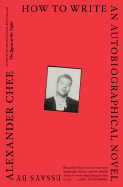
How to Write an Autobiographical Novel, an essay collection by novelist Alexander Chee, bears all the hallmarks of the writer's intelligence, curiosity and precision with language.
In these 16 essays, Chee (Queen of the Night) delineates the creative and emotional journey of a half-Korean gay kid from conservative small-town Maine, who emerges as an important voice in American literature. Chee maps the relationship between identity, activism, writing and literary prestige. In a spirit of playful yet earnest self-interrogation, he picks at his own façade in the early stages of his career. In "My Parade," he writes of venturing outside his social class trying to infiltrate the country's literary ranks: "While I didn't have their background, what I did have in these social settings were my looks, a sharp eye, a sharper tongue, and a penchant for making a spectacle of myself." In "Mr. and Mrs. B," he recalls working as a waiter for William Buckley--the famous conservative--to support himself as a writer. That Buckley denigrates AIDS victims while skinny dipping with young male servants is not lost on the impishly perceptive Chee.
As much as Chee's essays exhume the autobiographical details of his life, collectively they're concerned with something greater than autobiography--the struggle and triumph of the novel. In the collection's titular essay, he explains that writing fiction is necessary "because the ways you are human are not always visible to yourself." Entertaining and illuminating, How to Write an Autobiographical Novel excites and inspires creative thinking. In equal measure, the collection's humanity and grace will tug the heartstrings of the general reader. --Scott Neuffer, writer, poet, editor of trampset

